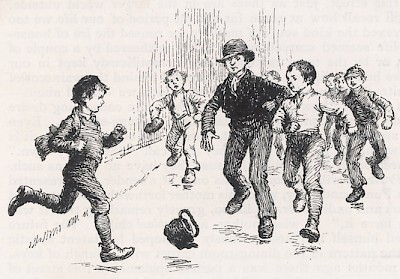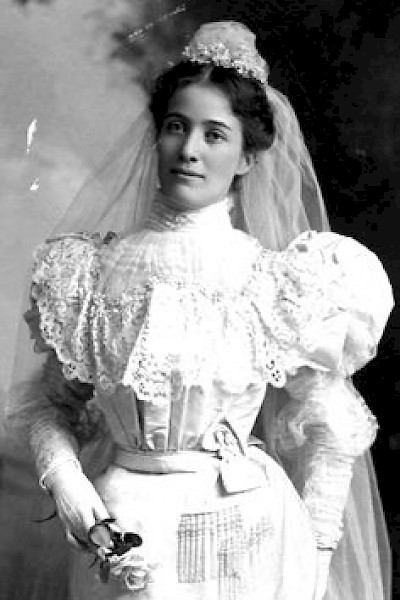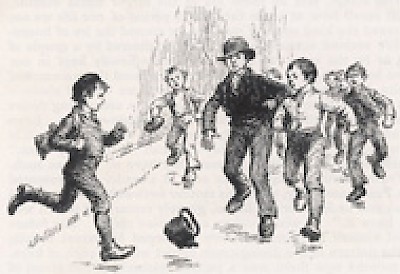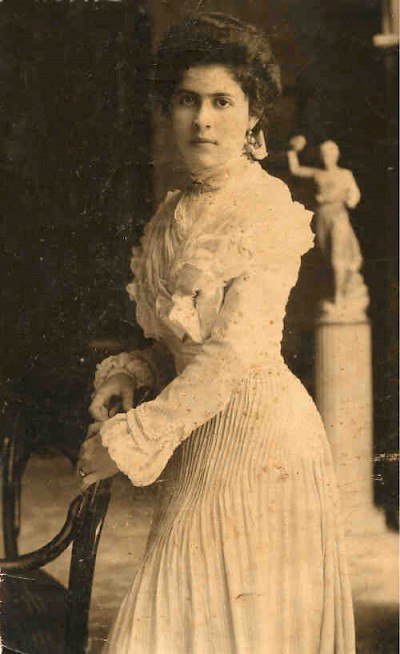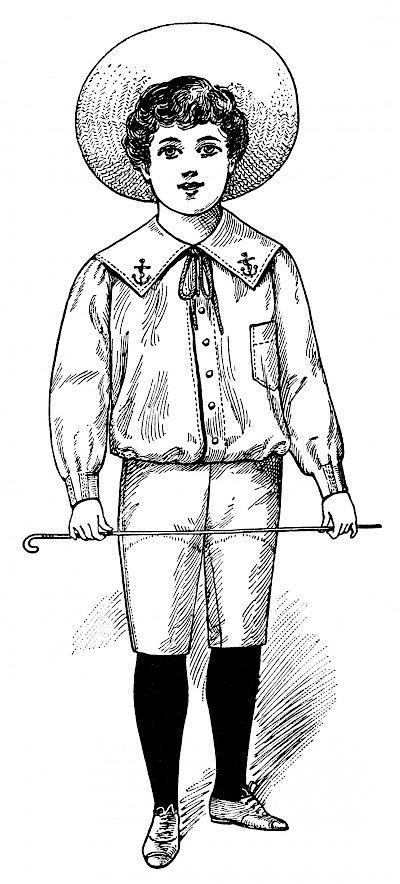One Last Effort: Chapter Fifteen
“Why don’t you marry Lupita?”
“Señora, for God’s sake!”
“Why are you so shocked? Is there anything else more natural? What better could happen to her than have the support of a dependable and honest husband like you?”
“Thank you, thank you for the praise,” responded don Hermenegildo, feeling the swell of satisfaction, “…but it’s settled; I’m not going back to thinking about marriage.”
“What?, ” replied doña Raimunda. “Are you saying that you’re old? Wrong. You’re not old yet.”
“Frankly, I don’t think I’m that old, but . . . it can’t be, señora; there is no way; believe me, I know what I’m talking about.”
“And the shortage of money isn’t a problem today; you have a good start and with what remains of her inheritance, you can live like rich people.”
That brief dialogue, nine months after the inauguration and thirteen after Lupita was widowed, had made a wreck of the bachelor’s nerves. How it grabbed hold of his mind and upended it, bothering him for part of the day and robbing him of hours of sleep during the night.
Well, doña Raimunda’s advice wasn’t completely misguided, nor was what she proposed to him something to stun the world.
If he dared! But impossible! One more disappointment. And Lupita was better than her mother. You’d better believe it! But to talk with her he would have to feel up to it and he didn’t. Lord, how luck was divided up in the world! Pancho Vélez had boldness to spare for wooing women and that had caused him harm. He, on the other hand, couldn’t even get married due to his timidity. Wouldn’t it have been better if Pancho Vélez had less audacity and he a little more courage?
But was it natural, having as he had so great a desire to marry, that he would allow himself to be so dominated by emotion? To say to a woman “Will you be my wife?” is not a crime, and the worst that can happen is that she says “No, go look elsewhere”. But, impossible. That would be miserable, and besides, God didn’t want him to get married. That was obvious. How many times hadn’t he seen matrimony slip through his fingers!
But why not make one last effort? That effort could hold the promise of happiness for him. Yes, it was necessary to try one more time; the last, to be sure, because he had already suffered many disappointments. For this reason he had to speak clearly to Lupita and without shaking. If great men had hesitated in the face of risky ventures, they wouldn’t have accomplished them. In order to achieve something, it is necessary to attempt it, and as he wanted to have a wife who would tend to him, who would caress him, who would make his life sweet and give him children . . . My God! What insanity! If he should one day have them . . . But it’s impossible. It is most unwise . . .
And why impossible? Was he perhaps decrepit? How many truly old men, and he could not really say that he was old, had children every day! What joy if Lupita should give him a son! And he would be sweet like his mother, and responsible and honorable like his father.
What would he name him? Caramba! The name! The name seems such a simple thing and one has to choose it carefully. So he would choose one that sounded good… something like a prince’s name. And what joyful hours he would spend with the mischievous little guy seated on his knees and holding up his little hands to pull his hair and tug on his mustache. What a lively child! With all the grace and vivaciousness of his mother. He would have to take good care of him to see that he didn’t go out in the damp air and catch a cold.
If he were to get sick! That would certainly be a serious problem. He would have to ask permission to be out of the office in order to stay close to the cradle and take every opportunity to give the little angel his medications. Lest the mother neglected to give them to him!
And the poor bachelor, his head a volcano of thoughts there in his lonely hammock, viewed with distress the little one’s pale face, and he checked his pulse repeatedly to see if the fever had dropped. But he would soon return from those beautiful fantasies to the reality of the small room that housed him, for if his nephews’ loud snoring did not rouse him from his golden musings, the shouts of one of the younger children did.
With more frequency than before, he could now be seen at the young woman’s home, and she received him very kindly. He reported all their conversations to doña Raimunda, who never failed to suggest that he resolve the situation, all the while doubting that her protegé would one day bring himself to do so.
One night, Lupita went to visit the licenciado’s robust spouse and, as always, the chairs were placed on the sidewalk. The bachelor had not yet arrived, nor any of the others who, although not with the constancy of don Hermenegildo, were regular members of the señora’s group.
After talking about the scarcity and poor quality of household help and lamenting that meat and other articles of daily consumption cost an arm and a leg, doña Raimunda, ending a pause that ensued, asked her visitor:
“And what do you have to tell me about don Hermenegildo?”
“Why do you ask? Has something happened to him?”
“Nothing, fortunately. But as he is in love with you. . . “
“With me? This is the first I’ve heard.”
“You expect me to believe that he hasn’t said anything to you?”
“Nothing, honestly. He comes to the house, but like always, the same as any other visit.”
“Well, the poor guy is constantly longing for you. And what do you think?”
“What do you want me to think? I haven’t thought of getting married again.”
“Even so, don Hermenegildo is a responsible man, honorable and he isn’t old.”
“That’s true. But I haven’t thought about such a thing. And is he capable of falling in love with someone?”
“You hear what I’m saying. He is like never before. When he goes to see you, the next day he tells me what he talked about with you and says that you were just as beautiful as ever.”
At that the clerk showed up on the corner. Already his appearance had notably improved with his change of position. His threadbare suit and old-fashioned hat were no more, and this and a more abundant and substantial diet that allowed for new beginnings seemed to have truly rejuvenated doña Raimunda’s friend.
And not only in his person could the benefits of the electoral triumph be noticed, as he now lived in a house not so far removed from the center and better looking. The furniture had been changed and the sister and nephews received a modest replacement of their clothes.
Seeing him coming, doña Raimunda set about getting him to make up his mind to deal with his amorous wishes.
The requisite greetings offered, with all the ceremony and pompousness that our hero poured forth, he turned to the young woman after seating himself and asked:
“And how is it going?”
“Nothing new, don Hermenegildo; and you?”
“As always, Lupita, as always. And the baby? That child is just as charming as his mother.”
Just then he took a straw cigar that doña Raimunda offered him, and his hand was trembling as if frightened by its modest owner’s daring gallantry.
The plump matron couldn’t help smiling and exclaimed:
“Now then, tell Lupita that you’re not in love with her.”
With these words, don Hermenegildo, who had turned shy with the inopportune tremor, felt like his tongue was stuck to the roof of his mouth and he could think of no convenient way out. While Guadalupe smiled, he commended himself in prayer to the entire celestial court.
His angel of mercy was Felipito, who had been playing with other boys some distance away and was now approaching, howling loudly. Alarmed, his mother went to meet him, asking what had happened and learned that a playmate, older than he, had apparently caused a bump on his forehead with a rock, then immediately taken off running.
“That bad boy!” bellowed the indignant señora. “He has to come back here and answer to me. But it’s your fault for playing with them. Since their mother doesn’t educate them…”
“Arnica, mi señora. A little cloth with arnica, for whatever happens,” counseled don Hermenegildo. “In these cases, it’s a great remedy. Believe me, I know what I’m talking about.”
And they brought the prescribed substance and Felipito received a careful rubbing over the injured area.
“And now, to bed,” doña Raimunda said to him giving him a shove. “That’s what you get for being disobedient.”
“Jesús, these boys! Girl, they make my blood boil. Wait until yours grows up a little and you’ll see. Here in the street, you know what it’s like. A game gets started early in the evening and it’s all shouting and racing around. For me, I don’t like Felipito involved in that, but the doctor insists that it’s advisable for him to jump and play because it’s good exercise for a child who’s thin. What’s more, the boy likes it and I understand that it’s natural for him at this age.”







